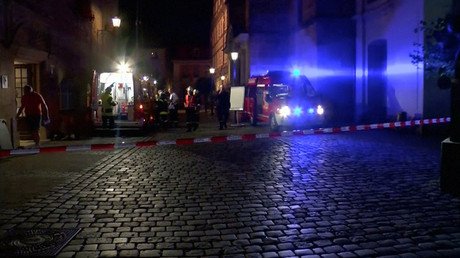Germany faces ‘perfect storm’ of fatal attacks
Although a complete U-turn of Chancellor Merkel’s open door policy is needed, Germany has to change its stance on meddling in Syria and its anti-terrorist policy as well, experts say.
Germany has witnessed a fourth violent attack against the public in just one week. On Sunday evening, a failed Syrian asylum-seeker set off a bomb in the Bavarian city of Ansbach, killing himself and injuring several other people. That follows an incident in the German town of Reutlingen where man wielding a machete randomly attacked passersby in the street killing at least one person and wounding two.
RT discussed with experts the recent attacks in Germany and their possible links to terrorism and the refugee crisis in Europe.
According to international affairs journalist Michael Opperskalski it is premature to draw links to the refugee crisis problem.
He warns more attacks are likely to happen especially in cities like Berlin, Frankfurt, and Cologne.
Firstly, the German government needs to make “a complete U-turn in their policy on refugees, on Syria and the anti-terrorist operations,” he says. As recent months have proven, “many of the people coming from Syria via Turkey have a clear-cut terrorist background and they came because the German government still continues to support regime change in Syria by all means, including supporting terrorists.”
Secondly, the German anti-terrorist policy has to be changed dramatically “because these guys here have built up a network especially in certain cities and regions of Germany and more attacks are going to come,” said Opperskalski.
Also, one of the reasons why further attacks may be possible is because “terrorists are slowly but definitely losing in Syria – ground and positions,” therefore they are seeking revenge.
“We have a complex situation that should be angled from different scenarios. And of course, this situation is used by extreme right-wing forces and even Nazi forces for their own purposes,” Opperskalski told RT.
Phil Butler from Everything PR News says the government is now under more pressure to change its policy on migration.
“That’s a different story when we are talking about politics and the government role in let’s call it “the water under the bridge” of this whole Arab Spring and refugee crisis. People are starting to learn now what caused this crisis and I think they blame government. Part of the Brexit thing is a little bit about that as well. The views towards the government and how the government has handled this whole situation is more towards the negative,” he told RT. At the same time, Butler says he there is not a lot of criticism about how police and local authorities are handling things.
Despite a lot of fury towards Chancellor Merkel's 'open door' policy, many do support her humanistic approach with the refugees.
Joaquin Flores of Independent Journalists Association for Peace described the situation as “a perfect storm.”
“To look at the open door policy by itself, is of course, only part of this equation. It is a big part of the equation but of course it has to do with NATO’s meddling in Syria, that has produced this refugee crisis and people as a result of this war, have uprooted millions of people who were leading normal lives and has radicalized them. And a very strange and contradictory process has taken place where people became refugees as a result of Wahhabi and would-be terrorism of the Muslim Brotherhood in Syria, left and began to live in Turkish aid camps and relocation camps where they encountered radicalized imams and aid workers who came not just to help but also in expectation that they would interpret the Koran in the same way. So, it has become a self-perpetuating cycle,” he told RT.
The statements, views and opinions expressed in this column are solely those of the author and do not necessarily represent those of RT.














